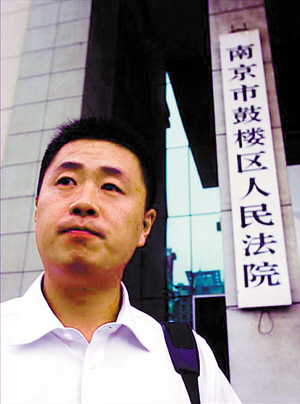'Good Samaritan' admits he pushed woman
 0 Comment(s)
0 Comment(s) Print
Print E-mail
Shanghai Daily, January 17, 2012
E-mail
Shanghai Daily, January 17, 2012
A "Good Samaritan" in Nanjing who helped take an elderly woman to hospital but protested after he was held liable for her injuries has been revealed as the person who knocked her down in the first place.
 |
|
Peng Yu in front of a court in Nanjing [File photo] |
Xu Shoulan was pushed to the ground at a bus stop in the capital of eastern Jiangsu Province.
Peng Yu, the man who helped her, was ordered to pay 45,877 yuan (US$7,275), a large share of the woman's medical bills, in an original ruling in September 2007.
Both sides appealed the judgment.
Peng claimed he had simply lent a helping hand for Xu after she fell down.
The case caused outrage across the country. It was cited numerous times as an example of how suspicion can fall on innocent people who are just trying to help others.
The case sparked heated debate about the response of people to tragic accidents.
After the case was reported, the number of people helping others in need saw a significant decrease.
However, now it has been revealed that Peng lied at the court hearing and he had, in fact, knocked Xu down, Outlook Weekly magazine reported yesterday.
Peng admitted accidently pushing Xu as he was getting off a bus, and agreed to pay her 10,000 yuan compensation in a settlement reached in March 2008. The two sides withdrew their appeals and came to an agreement that they would not disclose details of the case, Liu Zhiwei, director of Nanjing Political and Legal Affairs Commission, told the magazine.
Liu said he was disclosing the agreement because the case had been seriously misunderstood and was said to have been a turning point in moral standards.
Liu said he had the consent of Peng and Xu to do so, the magazine said.
Last October, at a market in Foshan in south China's Guangdong Province, a toddler was first struck by a van, then run over by another vehicle. A surveillance camera showed that over seven minutes, 18 people walked by the dying child and made no effort to help.
The accident aroused considerable speculation that Chinese citizens were losing their sense of moral decency.
Peng's case was cited as grounds for fears that people might be held responsible if they intervened in such accidents.





